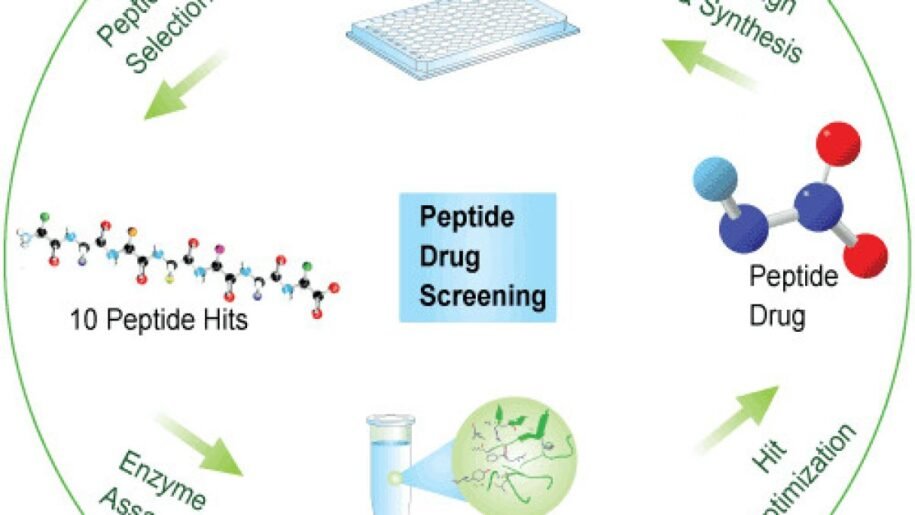Peptide library screening has become a critical tool in modern drug discovery, enabling researchers to identify potential therapeutic candidates with high specificity and efficiency. This technique plays a pivotal role in various fields, including pharmaceuticals, biotechnology, and medical research. A Peptide Library Screening Company provides essential services that help accelerate the development of novel treatments by screening and selecting peptides that exhibit desirable biological interactions.
In this article, we will explore the importance of peptide library screening, its key applications, and how it is revolutionizing the drug discovery process.
What is Peptide Library Screening?
Peptide library screening is a high-throughput method used to analyze large collections of peptides to identify sequences with specific biological activities. These libraries consist of vast numbers of peptides, either synthesized chemically or generated through display technologies such as phage display, yeast display, or mRNA display. Screening these libraries allows researchers to discover peptides that bind to target proteins, enzymes, or receptors, making them potential drug candidates or biomarkers.
Key Technologies in Peptide Library Screening
Several cutting-edge technologies facilitate the screening process, ensuring accuracy and efficiency:
1. Phage Display Technology
Phage display is one of the most widely used methods for peptide screening. In this approach, peptides are expressed on the surface of bacteriophages, which are then screened against target molecules. The most promising peptides are selected based on their binding affinity and specificity.
2. Yeast and mRNA Display
Yeast display and mRNA display are alternative methods that allow the expression and selection of peptides in different biological environments. These techniques offer unique advantages, such as enhanced stability and compatibility with complex biological systems.
3. Combinatorial Chemistry and High-Throughput Screening (HTS)
Combinatorial chemistry enables the synthesis of large peptide libraries, while high-throughput screening techniques allow rapid evaluation of peptide interactions with target molecules. Together, these approaches enhance the efficiency of drug discovery.
Applications of Peptide Library Screening
Peptide library screening has diverse applications across multiple scientific disciplines. Some of the most significant areas include:
1. Drug Discovery and Development
Pharmaceutical companies utilize peptide screening to identify new drug candidates that can target specific diseases. By selecting peptides with strong binding properties, researchers can develop therapies for conditions such as cancer, autoimmune disorders, and infectious diseases.
2. Antibody and Vaccine Development
Peptide libraries help identify antigenic peptides that can stimulate an immune response, aiding in the design of vaccines and monoclonal antibodies. This process is crucial for combating emerging infectious diseases.
3. Biomarker Discovery
By screening peptide libraries against biological samples, researchers can identify biomarkers associated with specific diseases. These biomarkers are useful for early diagnosis, prognosis, and personalized medicine.
4. Protein-Protein Interaction Studies
Understanding how proteins interact is essential for designing targeted therapies. Peptide screening allows scientists to study these interactions at a molecular level, providing valuable insights into disease mechanisms.
5. Agricultural and Environmental Research
Peptide screening is also used in non-medical fields, such as agriculture and environmental science. It helps in developing pest-resistant crops and detecting environmental toxins through biosensor applications.
Advantages of Peptide Library Screening
The benefits of peptide library screening make it an indispensable tool in research and drug development:
1. High Specificity and Affinity
Peptides identified through screening exhibit strong binding affinity to target molecules, ensuring precision in drug development.
2. Rapid and Cost-Effective Screening
Compared to traditional methods, peptide library screening accelerates the discovery process, reducing the time and cost associated with drug development.
3. Diversity and Versatility
Peptide libraries can be customized to contain a vast range of sequences, allowing for the identification of novel and unique candidates.
4. Non-Toxic and Biocompatible
Peptides are naturally occurring biological molecules, making them safer and more biocompatible than synthetic chemical drugs.
5. Potential for Personalized Medicine
With advancements in peptide screening, researchers can develop personalized therapies tailored to an individual’s genetic and molecular profile.
Future Trends in Peptide Library Screening
The field of peptide library screening is continuously evolving, with new technologies and approaches enhancing its effectiveness. Some emerging trends include:
1. AI and Machine Learning Integration
Artificial intelligence (AI) and machine learning algorithms are being used to analyze large peptide datasets, predicting the most promising candidates with improved accuracy.
2. Next-Generation Sequencing (NGS) for Peptide Libraries
NGS enables comprehensive analysis of peptide libraries, allowing for the identification of rare and highly specific sequences.
3. Peptide-Drug Conjugates (PDCs)
Peptides are increasingly being used as carriers for targeted drug delivery, improving the efficacy and safety of treatments.
4. Sustainable and Green Chemistry Approaches
New synthetic methods are focusing on environmentally friendly and sustainable peptide production to reduce chemical waste.
5. Expansion into New Therapeutic Areas
Peptide therapies are being explored for neurological disorders, metabolic diseases, and regenerative medicine, broadening the scope of peptide-based treatments.
Conclusion
Peptide library screening is transforming drug discovery by providing precise, efficient, and cost-effective solutions for identifying therapeutic candidates. Companies specializing in peptide screening play a crucial role in advancing medical research, vaccine development, and biomarker discovery. As technology continues to evolve, the potential applications of peptide screening will expand, offering new opportunities for innovation in healthcare and biotechnology.
With its ability to accelerate drug discovery and improve therapeutic outcomes, peptide library screening remains at the forefront of scientific research, helping shape the future of medicine.







